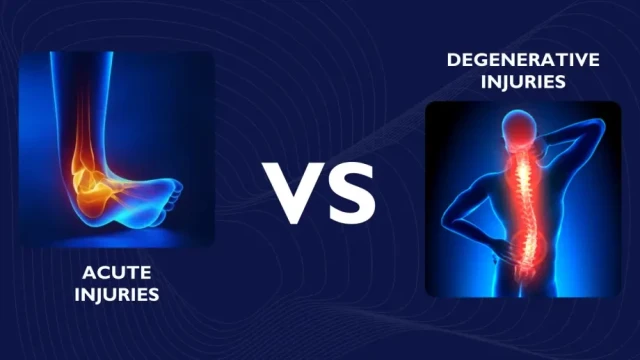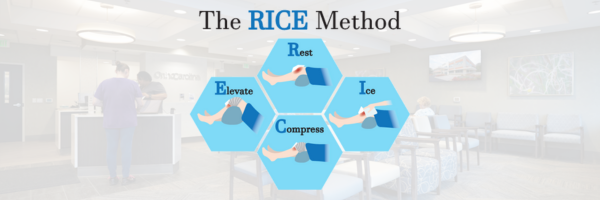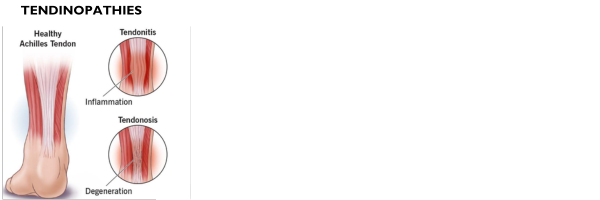
Navigating Diagnosis, Treatment, and Recovery for Optimal Health
Injuries are a part of life, whether you're playing organized sports, working a physical job, or just doing daily tasks. These injuries can be sudden, like a sprained ankle, or develop over time, like arthritis.
In orthopedics, injuries are typically categorized into two main types: acute and degenerative. Both can significantly impact an individual's quality of life and both require different treatment and management of care approaches. Understanding the difference between these two types of injuries is the starting point for finding the right orthopedic specialist for treatment.
What Are Acute Orthopedic Injuries?
Acute injuries are sudden and occur as a result of a specific trauma or impact. They often happen during activities such as sports, falls, or accidents. The onset of symptoms is immediate, and the injury is usually tied to a distinct event. Common examples of acute injuries include:
Fractures
A break or crack in a bone.
Sprains
Overstretching or tearing of ligaments, which connect bones to each other.
Strains
Overstretching or tearing of muscles or tendons, which connect muscles to bones.
Dislocations
Bones that were forced out of their normal position in a joint.

Symptoms of acute injuries are typically localized to the area of trauma and may include pain, swelling, bruising, and loss of function.
Diagnosis and Treatment of Acute Orthopedic Injuries
Diagnosis of acute injuries often involves a physical examination and imaging tests such as X-rays, CT scans, or MRIs to assess the extent of the damage. Treatment may range from rest, ice, compression, and elevation (RICE) to more invasive procedures like surgery, depending on the severity of the injury. Prompt medical attention is essential to ensure proper healing and to prevent complications.

Learn more about whether you should use Ice vs Heat for your injury, here.
What Are Degenerative Orthopedic Injuries?
Degenerative injuries, or degenerative conditions, on the other hand, develop over time and are often associated with aging and wear-and-tear of the body's tissues. These injuries are characterized by the gradual deterioration of joints, muscles, and bones, leading to conditions such as:
Osteoarthritis
The most common form of arthritis is where cartilage breaks down, causing pain and stiffness in the joints.
Tendinopathies
Chronic overuse injuries affect tendons, leading to pain and decreased function.

Degenerative disc disease
Age-related changes in the spinal discs that can cause back or neck pain. Unlike acute injuries, degenerative injuries present with symptoms that progressively worsen over time and are often correlated with repetitive movements or overuse.
Unlike acute injuries, degenerative injuries present with symptoms that progressively worsen over time and are often correlated with repetitive movements or overuse.
Diagnosis and Treatment of Degenerative Injuries
The diagnosis of degenerative injuries typically involves a comprehensive medical history, physical examination, and imaging studies to observe the changes in the affected structures. Treatment aims to manage symptoms and slow the progression of the condition. This may include physical therapy, medication, lifestyle modifications, and in some cases, surgical intervention.

Why Understanding Acute vs. Degenerative Injuries is Crucial for Effective Orthopedic Treatment
By understanding these distinctions, patients can work closely with their orthopedic specialists to develop a tailored treatment plan that addresses their specific needs and promotes optimal recovery and health. Early intervention can make a significant difference in the journey toward healing and regaining function.
Walk-in Orthopedic Urgent Care for Acute Injuries
If you suspect you have sustained either an acute or degenerative injury, it is important to consult with an expert at OrthoCarolina. For acute orthopedic injuries like ligament injuries, breaks, or dislocations, find an orthopedic urgent care near you. All OrthoCarolina Orthopedic Urgent Cares (OUCs) are staffed with orthopedic specialists so you can skip your primary care and head straight to the bone and joint specialists.

Same-Day Appointments for Degenerative Conditions
For those experiencing degenerative conditions, it is best to consult with a specialist by making an appointment. Find an appointment that fits your schedule, near you today by scheduling online. Same-day appointments are available for a number of locations!
Click here to schedule an appointment near you today.
Back




Leave a Comment